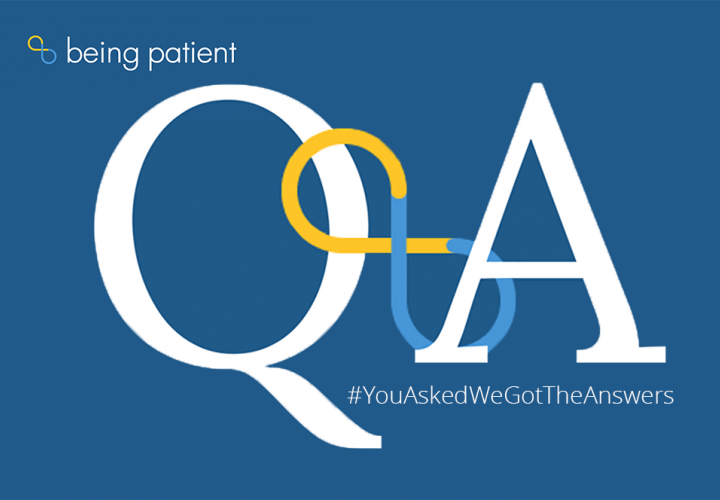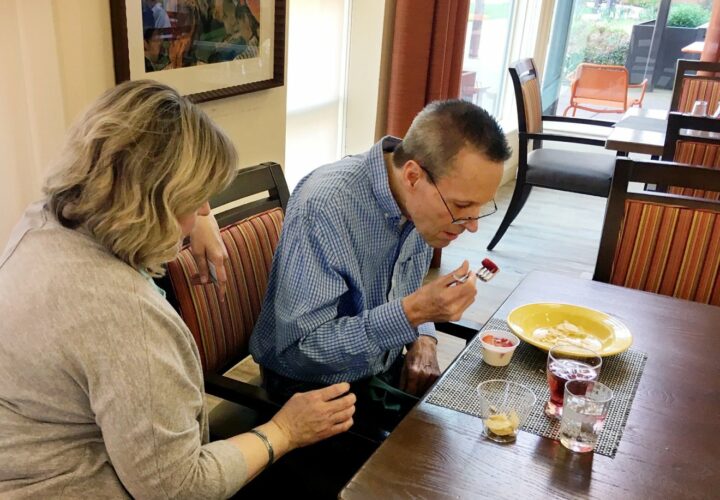Manging Alzheimer's, changing medication, prevention and clinical trials: We took all of your questions to an Alzheimer's expert.
After an Alzheimer’s diagnosis, many caregivers and patients feel as if they are sent away with a pamphlet, pills and little concrete advice on how to manage day-to-day behaviors or slow down cognitive decline.
To help answer your questions about Alzheimer’s, we spoke to Dr. Bill Burke, the director of the Stead Family Memory Center at the Banner Alzheimer’s Institute. He covered how to manage common behaviors, interact with doctors, receive an accurate diagnosis, whether brain games or supplements can slow cognitive decline, plus the latest news on clinical trials and where future research is headed.
Managing Alzheimer’s Behavior
Q: “I’m wondering, how do you help a loved one when they get confused about where they are, or when they keep repeating the same question over and over again?”
A: We have a variety of strategies we suggest. One of the things that can be helpful is to create a whiteboard with a simple list of what is happening that day and include information they keep asking repetitively about. I would also recommend a communication strategy that asks people to deflect and move on to a new topic. This helps move the conversation or topic to a more pleasant activity. These might be useful tools to help guide those strategies.
Q: “I would like to find a way to stop or slow down the rummaging. I try distractions, but they’re only short-term help. What is the reason they rummage, pack and re-pack all the time?”
A: The repetitive activity that some people experience who have dementia is likely a reflection of repeating familiar and reassuring activities. We sometimes will ask people to engage in an activity that takes time, is absorbing and can be repeated indefinitely. One example is to give your loved one a bucket of bolts and screws and ask them to put them together. At the end of the day, you can take them apart and do it all over again the next day. It is surprisingly effective and engaging for many people.
Q: “Do you have any suggestions for dealing with impulse control, especially spurts of physical aggression directed towards the primary caregiver?”
A: We usually would start with trying to engage individuals in some activity that they enjoy. The person with dementia often does very well with routine activities and has difficulty adjusting to novel situations. We will often recommend day program attendance to allow people to use the social part of their brain and work on finding appropriate activities for their level of ability.
Q: “My husband goes to the bathroom six to seven times at night through the morning. Is there any medication for that because I’m getting less sleep every day?”
A: I would suggest talking to your primary care doctor about evaluating this issue. There are some medications that might be helpful. It would also be worthwhile to try and restrict fluids in the evening and set a regular schedule for bladder emptying. A schedule that is every two hours works very well for many people. It is very important to rule out medical problems for this nocturnal urination.
Q: “My husband takes 75 mg of sertraline, along with 0.5 mg of risperidone at bedtime. He still wakes up and prowls, gets into things and generally won’t let me sleep. I’m afraid to. Would I be able to safely add melatonin to keep him sleeping?”
A: I would certainly ask your doctor about this. Low doses of melatonin are generally well tolerated. I would be careful about increasing the dose. However, since some people will have daytime fatigue if the dose is too high. There are other medications additionally that might be helpful, so please discuss with your doctor.
Getting an Alzheimer’s Diagnosis
Q: “How many stages does one go through when diagnosed with dementia?”
A: There are several ways to stage dementia. We use a simple form in our clinic, which divides stages of dementia into mild, moderate and severe. The person with mild dementia may have cognitive problems but is still able to do most daily activities. Persons with moderate dementia start to see more of an impact on daily function and almost always need to have a caregiver for safety. Persons with severe dementia begin to have care issues that are more nursing specific and will often require more care than a single person is able to provide without external help.
Q: “How should I deal with doctors who refuse to believe I have dementia, just because I recognize them from the day prior?”
A: We know that many physicians are not well versed in recognizing and diagnosing dementia. There are many resources available for physicians to learn more about dementia, such as those provided by the Alzheimer’s Association.
Q: “One doctor has said my husband has dementia due to mood swings. His new doctor is not so sure. He is 91. Just wondering how to get a diagnosis or if we should just watch and wait?”
A: We don’t typically think of dementia being due to mood swings. There is some increased risk of dementia for persons who have had serious depression in midlife. Also, at age 91 the most likely cause of dementia is a “mixed” dementia – meaning that there are multiple factors involved. For example, we will see people have some changes of Alzheimer’s disease, some changes in their blood vessels, and an accumulation of other proteins that are harmful to memory.
Q: “Why isn’t there more concern among doctors about differentiating amnestic dementia, Alzheimer’s, from dementias that initially impact other domains, such as how primary progressive aphasia impacts language? From my experience as a former care partner, primary progressive aphasia seems to offer possibilities for early interventions that may not be possible with Alzheimer’s dementia.”
A: The ability to differentiate different types of dementia requires a great deal of experience and expertise. The distinctions can be quite complicated. I agree that a proper diagnosis is extremely beneficial and many potential therapies require an accurate diagnosis. Hopefully, we will have more specialists in the future who are capable of making these key distinctions.
Q: “Can frontotemporal dementia be caused by damage from a brain tumor that has been removed previously?”
A: FTD is not the result of a brain tumor or its removal. But a brain tumor that affects the frontal lobe of the brain can mimic FTD. There is also the potential that radiation used to treat a tumor in this location can also cause damage that can produce behaviors that look like FTD.
Q: “So even though my symptoms are progressive it only mimics FTD? It is not actually FTD? How can you tell the difference?”
A: I think it would be very difficult to attribute any change in behavior to anything but a direct effect of the tumor or its treatment in that location. That area is extremely important for behavior and I think it would be highly unlikely to have both a brain tumor in that region and FTD.
Brain Games, Medication and Supplements: What Works and What Doesn’t?
Q: “What does recent research show concerning brain games?”
A: We generally recommend trying to keep as mentally active as possible. The research about the impact on cognition is pretty mixed. I believe that it is very important to try to stimulate brain activity. Many people with dementia have short-term memory difficulties, but many other parts of the brain work just fine. I also strongly recommend social engagement since our social part of the brain stays intact much later than our memory facility.
Q: “I facilitate a support group for care partners, and lately, many have been discussing the pros and cons of medications and supplements. Some have tried meds like Namenda and Aricept, while others have tried coconut oil; others wonder about the advantages of joining clinical trials that involve new drug treatments. What would be your recommendations for those in early diagnosis of some kind of dementia as well as for their care partners regarding medical/supplemental treatments?”
A: The FDA in the last several weeks issued a major statement about supplements in older adults. They have issued “cease and desist” letters to many supplement companies. They have done so before, but the companies just tend to pay the fines and keep selling their product. There is no evidence that any supplement does anything to improve cognition. Many claim to have had positive clinical trials, but that is not true and why the FDA has taken this action. We are very interested in clinical trials for persons who have very early symptoms and I would strongly recommend participating if possible. Thanks!
Q: “What is your opinion on fish oil?”
A: Fish oil has been tested as individual components and has not been shown to have any impact on cognition. However, we know from other studies that cultures who eat more fish as part of their diet seem to have a lower rate of dementia. My recommendation would be to eat more fish and skip the fish oil supplements.
Genetic Risk and Alzheimer’s
Q: “I recently read that only 2 percent of offspring of an Alzheimer’s patient are likely to develop Alzheimer’s and that brain health is key to not being part of that 2 percent. How accurate is that in your estimation?”
A: We believe that having a first-degree relative—a mother, father, brother or sister with the disease—increases your risk overall by 3–4 fold. The risk is strongly age-related, though. The rate of dementia climbs steeply from age 65 on up. There is very strong evidence that physical exercise can be key to preventing dementia as well as recent evidence that careful control of blood pressure may play a major role.
Q: “I am 70 years old. My mother, her mother and all five of my mother’s siblings had either dementia or Alzheimer’s. Should I get checked for the APOE4 gene?”
A: We typically do not check for the APOE4 gene in our clinic patients unless they are potentially interested in participating in a clinical trial. If a person does wish to know, I would strongly recommend that testing be done with genetic disclosure from an expert because the results can be complicated to understand. There is also the possibility that finding out your genetic status may provide information to other people in the family, such as children, who may not wish to have that information. So I would carefully consider that testing.
The Beta-Amyloid Theory, Clinical Trials and Research’s Next Step
Q: “My husband was in a study for two years with Roche. It was stopped in February when everyone in the study would get the drug. It was stopped before year three of the trial. I think my husband was getting the drug. Since it stopped, I can already see a big decline. I read the report from the drug company and it was showing progress with Alzheimer’s patients. Not as much as the drug company wanted: to stop it where it is. I feel blessed that my husbands has gone slowly for two years. He is 74 and they think it may have started in his 60’s. Why would they stop it when it was helping some? We are devastated about this.”
A: One of the very challenging parts about clinical research is that the studies are set up to compare a group getting a placebo and a group getting the study drug. The comparison is made over time and there are periods during the study when they will do a statistical check to make sure that the study could find an actual difference between the drug and placebo at the end of the study. If there is no chance that such a difference can be found, the study is stopped. That happened just this morning with aducanumab and it is a sobering reminder to someone like me, who has been doing this for 30 years, just how much we rely on new ideas and new possibilities in this field. We are incredibly dedicated to continuing, despite any setbacks that we run into. We very much appreciate all of the people who participate in trials because we will never have a new treatment unless people are willing to work with us. Thank you!
Q: “What are your thoughts on the beta-amyloid theory after the latest news on aducanumab?”
A: We know that amyloid is a key player for persons with early-onset Alzheimer’s disease. All of the known genetic mutations that cause early-onset Alzheimer’s disease result in excess amyloid production. We still believe that starting earlier is going to be extremely important since we know that amyloid accumulates for 10 years before a person develops dementia. We believe that prevention trials are critical to evaluating the role of amyloid in the cause of the disease.
Q: “What about the reports associating increased amounts of amyloid with areas more affected by air pollution, especially particulate matter? Should this be a priority in research?”
A: We are very concerned about the impact of pollution in the air and in our water, but we’re still trying to understand what specific elements are hazardous. Generally, it is a priority for our general health to have clean air and clean water.
Q: “Do you see anything promising in current clinical trials or research?”
A: We are extremely interested in prevention of Alzheimer’s disease at Banner Alzheimer’s Institute. We have great hopes for a series of prevention trials that we are conducting in persons who are at high genetic risk for the disease. I am also very impressed by the amount of data that supports exercise as a strong method of prevention and I would strongly recommend that we try to make that information well known.
Q: “New research on Alzheimer’s comes out daily—vaccines, eye scans that detect dementia, light therapy that shows promise in mice, fasting as a treatment. What is the most exciting thing about dementia research in your opinion? And what are we most realistically close to achieving?”
A: I am most excited about the new era of prevention trials. I think it is crucial that we institute prevention strategies before a large number of nerve cells are damaged in the brain. I have mentioned exercise as a strategy available today, and we are looking for new strategies that may add to this.
Q: “Do you think research in brain neuroplasticity could lead to effective interventions with any of the dementias?”
A: This is a developing area of research. There have been a number of trials, for example, that have targeted neuroplasticity with small molecules that have not proven effective. Nevertheless, I think this area has much promise for the future.
Q: “Who serves on an IRB that approved the protocol for a clinical trial? How are they selected?”
A: There are many types of IRBs. Some are at a local level and some are national or even international. They usually are composed of people from a variety of backgrounds, including people with strong regulatory knowledge, people with knowledge of clinical research and members of the community at large. There is a separate group involved in clinical trials which is a data monitoring committee that is responsible for the oversight of a trial through its conduct. These monitoring committees are those who make the decision about whether a study should continue or not. And they are constantly looking for any safety concerns during the study. These groups are primarily made up of people who do clinical research in that area, like me.
Q: “What are some new clinical trials coming down the pike?”
A: One of the major changes in the last year or two is that we now have a series of studies that are aimed at the Tau protein rather than amyloid. Tau accumulation in the brain tracks much more closely to cognitive decline than does amyloid. We are looking at studies that will hopefully prevent the spread of Tau throughout the brain. There are multiple other studies in progress looking at other potential mechanisms as well.
Q: “How do you get started with a clinical trial? Is it something you talk to your doctor about?”
A: You certainly could start with your doctor. There are also many online resources that can tell you about studies and where they are being offered. ClinicalTrials.gov is one good source that keeps reasonably up to date on new studies. The National Institute on Aging has a wonderful web page that also can provide information about new trials and has mailing lists you can subscribe to. At Banner, we have the Alzheimer’s Prevention Registry, which will also inform you about new research opportunities and will send a limited number of emails to keep you up to date. I would highly recommend checking it out.



